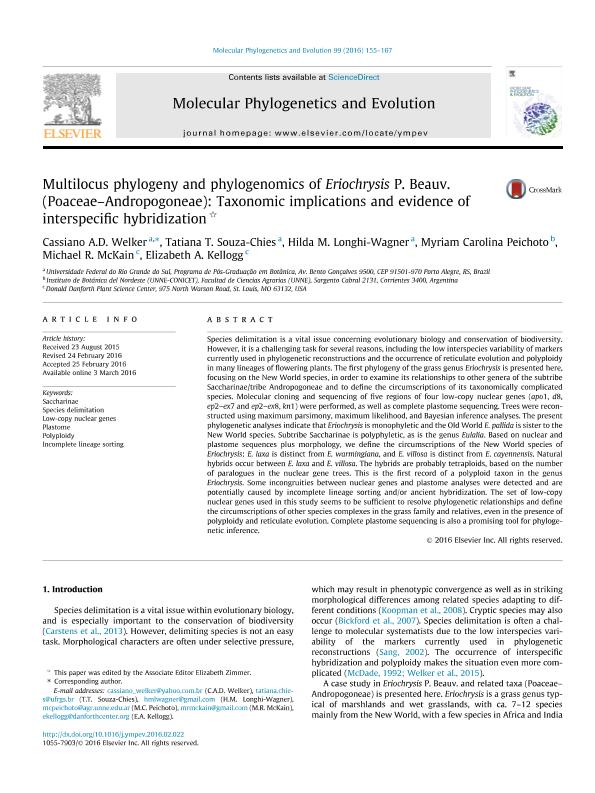Mostrar el registro sencillo del ítem
dc.contributor.author
Welker, Cassiano A. D.
dc.contributor.author
Souza Chies, Tatiana T.
dc.contributor.author
Longhi Wagner, Hilda M.
dc.contributor.author
Peichoto, Myriam Carolina

dc.contributor.author
McKain, Michael R.
dc.contributor.author
Kellogg, Elizabeth Anne

dc.date.available
2017-07-14T17:26:33Z
dc.date.issued
2016-06
dc.identifier.citation
Welker, Cassiano A. D.; Souza Chies, Tatiana T.; Longhi Wagner, Hilda M.; Peichoto, Myriam Carolina; McKain, Michael R.; et al.; Multilocus phylogeny and phylogenomics of Eriochrysis P. Beauv. (Poaceae–Andropogoneae): taxonomic implications and evidence of interspecific hybridization; Elsevier; Molecular Phylogenetics and Evolution; 99; 6-2016; 155-167
dc.identifier.issn
1055-7903
dc.identifier.uri
http://hdl.handle.net/11336/20590
dc.description.abstract
Species delimitation is a vital issue concerning evolutionary biology and conservation of biodiversity. However, it is a challenging task for several reasons, including the low interspecies variability of markers currently used in phylogenetic reconstructions and the occurrence of reticulate evolution and polyploidy in many lineages of flowering plants. The first phylogeny of the grass genus Eriochrysis is presented here, focusing on the New World species, in order to examine its relationships to other genera of the subtribe Saccharinae/tribe Andropogoneae and to define the circumscriptions of its taxonomically complicated species. Molecular cloning and sequencing of five regions of four low-copy nuclear genes (apo1, d8, ep2–ex7 and ep2–ex8, kn1) were performed, as well as complete plastome sequencing. Trees were reconstructed using maximum parsimony, maximum likelihood, and Bayesian inference analyses. The present phylogenetic analyses indicate that Eriochrysis is monophyletic and the Old World E. pallida is sister to the New World species. Subtribe Saccharinae is polyphyletic, as is the genus Eulalia. Based on nuclear and plastome sequences plus morphology, we define the circumscriptions of the New World species of Eriochrysis: E. laxa is distinct from E. warmingiana, and E. villosa is distinct from E. cayennensis. Natural hybrids occur between E. laxa and E. villosa. The hybrids are probably tetraploids, based on the number of paralogues in the nuclear gene trees. This is the first record of a polyploid taxon in the genus Eriochrysis. Some incongruities between nuclear genes and plastome analyses were detected and are potentially caused by incomplete lineage sorting and/or ancient hybridization. The set of low-copy nuclear genes used in this study seems to be sufficient to resolve phylogenetic relationships and define the circumscriptions of other species complexes in the grass family and relatives, even in the presence of polyploidy and reticulate evolution. Complete plastome sequencing is also a promising tool for phylogenetic inference.
dc.format
application/pdf
dc.language.iso
eng
dc.publisher
Elsevier

dc.rights
info:eu-repo/semantics/openAccess
dc.rights.uri
https://creativecommons.org/licenses/by-nc-sa/2.5/ar/
dc.subject
Saccharinae
dc.subject
Species Delimitation
dc.subject
Low-Copy Nuclear Genes
dc.subject
Plastome
dc.subject
Polyploidy
dc.subject
Incomplete Lineage Sorting
dc.subject.classification
Ciencias de las Plantas, Botánica

dc.subject.classification
Ciencias Biológicas

dc.subject.classification
CIENCIAS NATURALES Y EXACTAS

dc.title
Multilocus phylogeny and phylogenomics of Eriochrysis P. Beauv. (Poaceae–Andropogoneae): taxonomic implications and evidence of interspecific hybridization
dc.type
info:eu-repo/semantics/article
dc.type
info:ar-repo/semantics/artículo
dc.type
info:eu-repo/semantics/publishedVersion
dc.date.updated
2017-06-08T19:47:24Z
dc.journal.volume
99
dc.journal.pagination
155-167
dc.journal.pais
Estados Unidos

dc.journal.ciudad
Nueva York
dc.description.fil
Fil: Welker, Cassiano A. D.. Universidade Federal do Rio Grande do Sul; Brasil
dc.description.fil
Fil: Souza Chies, Tatiana T.. Universidade Federal do Rio Grande do Sul; Brasil
dc.description.fil
Fil: Longhi Wagner, Hilda M.. Universidade Federal do Rio Grande do Sul; Brasil
dc.description.fil
Fil: Peichoto, Myriam Carolina. Consejo Nacional de Investigaciones Científicas y Técnicas. Centro Científico Tecnológico Conicet - Nordeste. Instituto de Botánica del Nordeste. Universidad Nacional del Nordeste. Facultad de Ciencias Agrarias. Instituto de Botánica del Nordeste; Argentina
dc.description.fil
Fil: McKain, Michael R.. Donald Danforth Plant Science Center; Estados Unidos
dc.description.fil
Fil: Kellogg, Elizabeth Anne. Donald Danforth Plant Science Center; Estados Unidos
dc.journal.title
Molecular Phylogenetics and Evolution

dc.relation.alternativeid
info:eu-repo/semantics/altIdentifier/url/http://www.sciencedirect.com/science/article/pii/S105579031600066X
dc.relation.alternativeid
info:eu-repo/semantics/altIdentifier/doi/http://dx.doi.org/10.1016/j.ympev.2016.02.022
Archivos asociados
